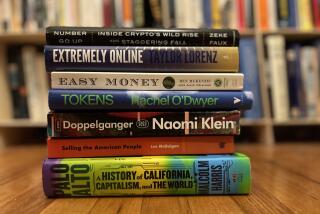Actually, that ‘off target’ 1995 anti-Internet column was amazingly on-target
- Share via
Back in 1995, astronomer and computer expert Clifford Stoll wrote an article for Newsweek dismissing all the excitement about something called the Internet. It was headlined, “The Internet? Bah!”
Stoll ridiculed the claims of “Internet hucksters” that we might someday buy books, music and airline tickets over the Internet, or make restaurant reservations, or that we’d live in a world of telecommuting workers and interactive libraries.
Every few years, someone unearths the piece to guffaw at its naivete. In 2010 it was BoingBoing and Slate.com’s Farhad Manjoo, who wrote that Stoll’s mistake was that he didn’t anticipate that after 1995, “a few magical things came and changed everything.”
More recently, Stoll’s piece was dug up by W. Joseph Campbell, a communications professor at American University, who celebrated its 20th anniversary (the column appeared in Newsweek on Feb. 26, 1995) by calling it “so breathtakingly off target that it has become something of an online cult classic.”
Here’s the thing that BoingBoing, Manjoo and Campbell missed, however. A few of Stoll’s points may be off-target, but for the most part, he was dead right.
Stoll predicted that the Web would be a fount of misleading information and outright lies, that it would be oversold as a tool for education and governing, and that it would isolate people more than bring them together. “A network chat line is a limp substitute for meeting friends over coffee,” he wrote. “No interactive multimedia display comes close to the excitement of a live concert. And who’d prefer cybersex to the real thing?”
A few words about Stoll, who is now 64. He was no computing dilettante in 1995, but an experienced network user who had become famous by tracking down and exposing Markus Hess, a notorious hacker of the 1980s. Stoll chronicled his exploit in the 1989 book “The Cuckoo’s Egg,” which remains one of the best books about hacking ever.
He followed up in 1995 with a collection of essays called “Silicon Snake Oil,” from which the Newsweek piece was loosely adapted. Today he designs cellphone networking software and manufactures and sells Klein bottles--think of them as three-dimensional cousins of the Moebius Strip--in Oakland.
Stoll told me by phone that he hasn’t read the Newsweek column since it was published, but he’s a bit abashed that he wrote it in language that he uses “when I scribble notes to myself”--terms like “Baloney” and “Bah.” He said he doesn’t engage much with the issues he raised then--”the Internet has left me behind; it’s as if I belong to a different universe”--but with minimal prompting he’ll talk about how Web surfing and smartphone chatting are poor substitutes for experiencing the real world.
In the column, which Newsweek retitled online as “Why the Web Won’t be Nirvana,” Stoll’s biggest misses involved e-commerce and e-books.
“We’re promised instant catalog shopping—just point and click for great deals,” he scoffed. “We’ll order airline tickets over the network, make restaurant reservations and negotiate sales contracts. Stores will become obsolete. So how come my local mall does more business in an afternoon than the entire Internet handles in a month?”
Electronic publishing? “Try reading a book on disc. At best, it’s an unpleasant chore: the myopic glow of a clunky computer replaces the friendly pages of a book. And you can’t tote that laptop to the beach. Yet Nicholas Negroponte, director of the MIT Media Lab, predicts that we’ll soon buy books and newspapers straight over the Internet. Uh, sure.”
Yet those misfires were more than compensated for by all the predictions Stoll got right.
--Education. “We’re told that multimedia will make schoolwork easy and fun....Who needs teachers when you’ve got computer-aided education? Bah. These expensive toys are difficult to use in classrooms and require extensive teacher training....But think of your own experience: can you recall even one educational filmstrip of decades past? I’ll bet you remember the two or three great teachers who made a difference in your life.”
Every point Stoll makes here is correct. Internet hucksters like Secretary of Education Arne Duncan are still trying to push expensive hardware and software into the public schools. Think of ex-LAUSD Superintendent John Deasy’s disastrous iPad project.
--Government. “Visionaries...speak of electronic town meetings.” In some ways, it’s true, the Internet has made government more transparent. But in other ways, it has made government more intrusive--and more efficiently so. Anyone who doubts that should consult the collected works of Edward Snowden.
--Information. “Every voice can be heard cheaply and instantly,” Stoll observed, referring to the online chat community then known as Usenet. “The result? Every voice is heard. The cacophony more closely resembles citizens band radio, complete with handles, harassment, and anonymous threats. When most everyone shouts, few listen.”
Stoll was astonishingly on-target here. Does anyone really believe that today’s Internet has improved our ability to winnow truth from misinformation, disinformation, and plain ignorance? Every social medium is infected, as he forecast, with harassment and abuse--often aimed at innocent individuals. Last week, the Internet was preoccupied with two real important questions: What color is some dress, and how did the cops ever corral a couple of llamas? One thing you can say about any video or meme that goes “viral” on the Web, with only a handful of exceptions: It’s utterly trivial, like the chatter on those old CB radios. The Internet hasn’t created a world community of better-informed individuals; it’s helped cant and ideology take over.
Stoll was even right about some aspects of e-commerce and e-reading. He questioned whether sending money over the Internet was entirely “trustworthy.” It’s still not. Many people still find reading a book on an iPad or other tablet irksome (Kindles are much better). And you still have to be nuts to bring a $400 piece of hardware to the beach.
People who trot out Stoll’s 1995 piece as though it’s a flawed prediction of the future haven’t read it carefully. More to the point, they seem to be unaware of the real drawbacks of today’s networked world. Stoll, who has experience teaching grade schoolers and grad students, reminds us that facility with computers isn’t really what makes youngsters successful.
“What I want to see in students,” he told me, “is not competence with a computer, but curiosity, enthusiasm, a yearning to fool around with the very mundane world around them, not disappear into movies. I’ve yet to find any group of YouTube videos that could set me on a path the way my 11th grade science teacher did.”
Keep up to date with the Economy Hub. Follow @hiltzikm on Twitter, see our Facebook page, or email [email protected].
More to Read
Inside the business of entertainment
The Wide Shot brings you news, analysis and insights on everything from streaming wars to production — and what it all means for the future.
You may occasionally receive promotional content from the Los Angeles Times.











